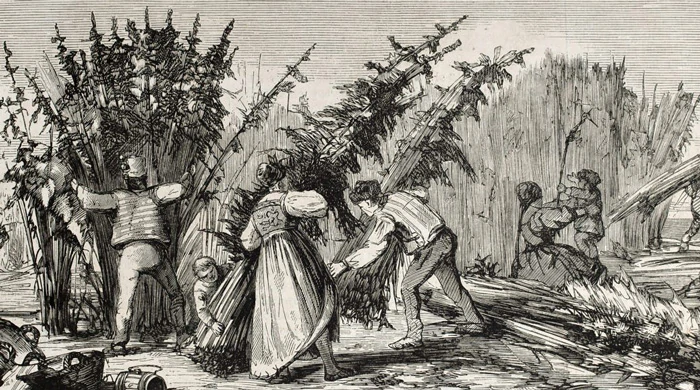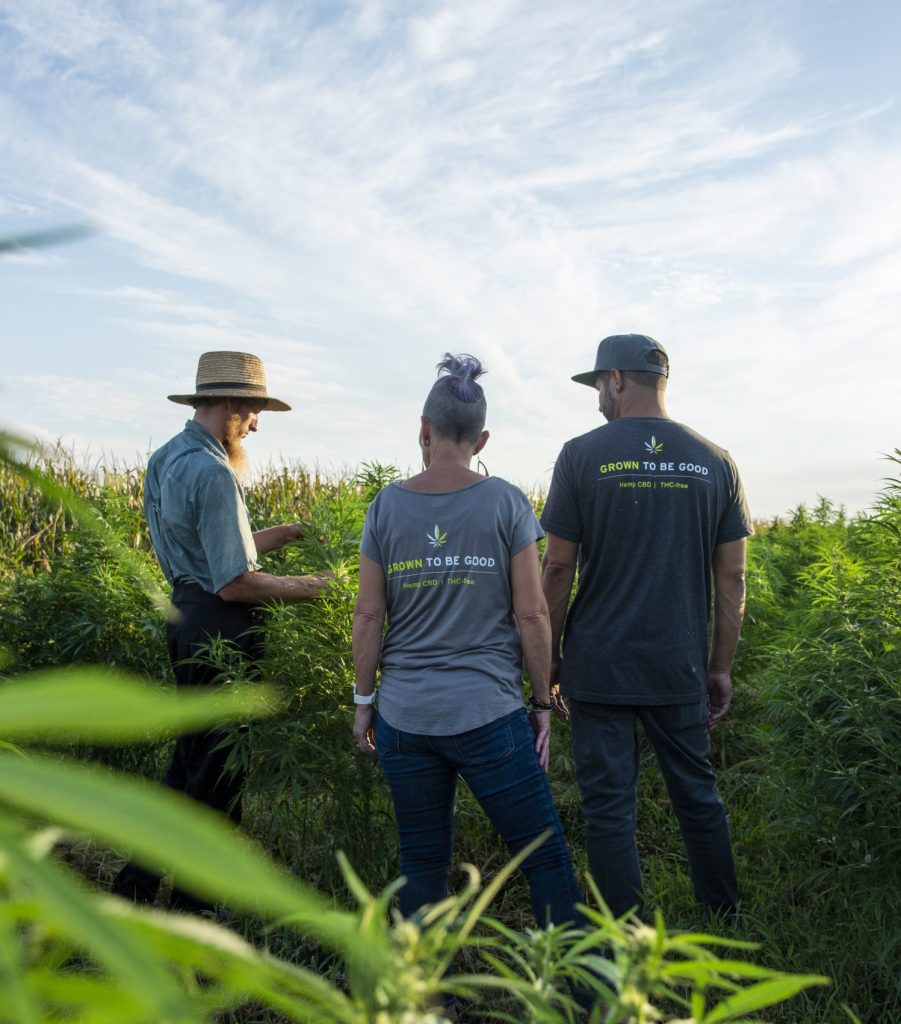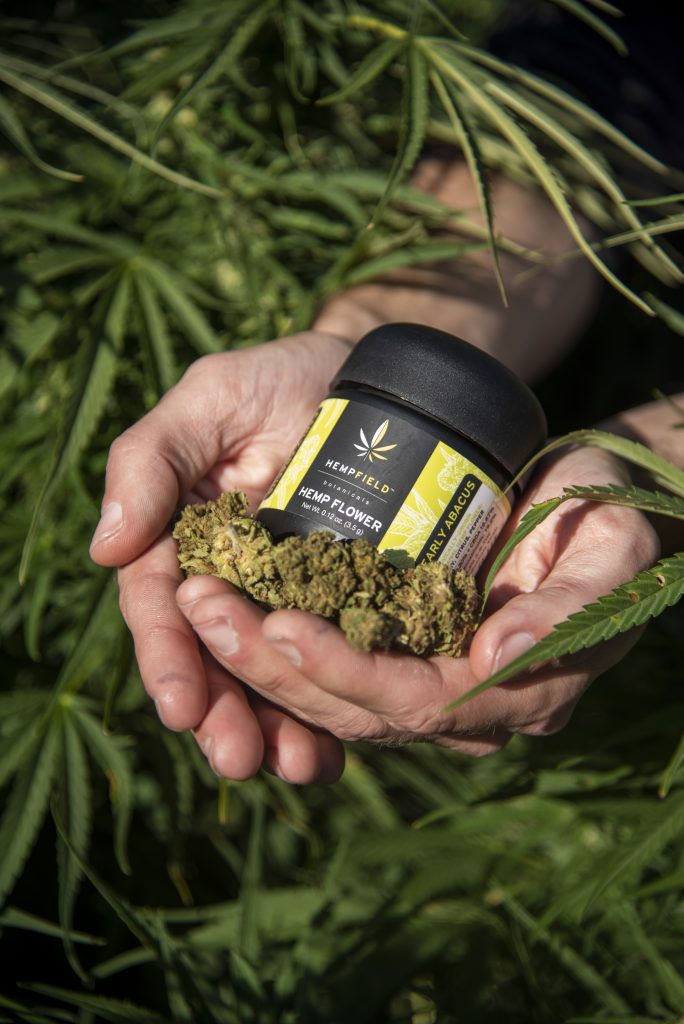CBD is everywhere these days — in skincare products, at your neighborhood corner store, and on the websites of countless online retailers. But not all CBD is created equal. The quality of hemp can vary vastly from one brand to the next, so you should be aware of where the hemp in the products you buy comes from. With an abundance of CBD and hemp products on the market and no strict regulations, it falls on the consumer to make informed buying decisions based on the products’ impact on their bodies and the environment. Where hemp is sourced matters, which is why Hempfield Botanicals chooses to source our hemp from the local, organic hemp farms maintained by Amish hands in Lancaster, PA.
April is the month of sowing seeds and planning which crops to cultivate for the months ahead and Earth Day and 4/20. To celebrate, we’re taking you on a journey from seed to smoke and farm to pharmacy, focusing on hemp in Pennsylvania and how it’s grown and sourced.

Early Days of Lancaster Hemp
We are blessed to be stationed in the heart of Lancaster County, surrounded by fertile soil and centuries-old farms that the Amish have tended since the 1700s. This allows us to provide the highest quality organic hemp and CBD using sustainable farming methods.
Hemp is one of the world’s oldest cultivated plants with records of healing ailments since 2800 BC. The hemp trade was a driving force in the early colonization of America, coveted for its seeds, oil, fiber, and medicinal properties.
In Lancaster, hemp was an abundant cash crop, which is the inspiration behind our name — Hempfield Botanicals — which refers to the fields of hemp that wove across the hills! Lancaster has maintained its farming roots from the early days of hemp farming to the present day and now boasts having one of the nation’s leading farmland preservation programs.
Lancaster County covers roughly 608,000 acres in Southeastern Pennsylvania, and of those acres, almost two-thirds of the county is used for farming.
The Lancaster Farmland Trust has preserved more than 100,000 acres, placing Lancaster County first among counties nationwide. The mission of the Agricultural Preserve Board is “to forever preserve the beautiful farmland and productive soils of Lancaster County and its rich agricultural heritage; and to create a healthy environment for the long-term sustainability of the agricultural community and farming as a way of life.”
Farms are preserved not on appearance but on their soil quality, farm viability, and proximity to already preserved farms. One unique aspect of Lancaster farms, specifically Amish farms where we source our hemp, is the average size is 85 acres, and tilling is done with farm animals rather than machinery. This ensures the land is thoughtfully maintained and nurtured with care. It also preserves old-time farming methods that leave far less of a carbon footprint than large, machine-operated farms.
Difference Between Sustainable and Organic
The words “sustainable” and “organic” are often used interchangeably, but they hold different merits. We will explain how we use sustainable methods to produce organic hemp.
Sustainable
The word sustainable originates from the Latin word sustinere, meaning to keep in existence. So, “sustainable,” broadly is used to encompass not just the conservation of non-renewable resources (soil, energy, minerals) but also issues of environmental, economic, and social sustainability. Sustainability implies striving for “closed system” farming, with farms that are self-sufficient, requiring minimal outside input.
Identification of sustainability is based on hypotheses regarding the sustainable management of natural resources, maintaining their productive capacity through time, which implies a constant process of monitoring and reevaluation.
Organic
The word organic was first coined in the 1940s, advocating for a society made up of small, self-contained units where both people and nature are viewed as crucial components of production.
A modern definition of organic farming, according to the USDA, is the application of a set of cultural, biological, and mechanical practices that support the cycling of on-farm resources, promote ecological balance, and conserve biodiversity.
These include:
- Maintaining or enhancing soil and water quality
- Conserving wetlands, woodlands, and wildlife
- Avoiding use of synthetic fertilizers, sewage sludge, irradiation, and genetic engineering
The Amish hands who tend the fields use sustainable methods to produce an organic product, creating a spiritual link between the farmer and soil.

Lancaster, PA Amish: The Farmers Behind Our Organic Hemp
Since we’re on a perpetual quest to go green and live in an eco-friendly manner, we appreciate the agrarian group known as the Amish, whose strict socio-religious rules control farming practices.
Amish farming is a blend of centuries-old practices with new ideas. They maintain their farms similarly to the approach used on farms before the Industrial Revolution. Since the Amish don’t connect to power grids, their farming methods are highly energy-efficient, relying solely on horses and hand labor. This eliminates fossil fuel emissions, making their practices among the most eco-friendly farming methods.
With an immeasurable work ethic, following the seasons like clockwork, and putting great care into maintaining the quality of their soil, Amish farms cultivate hemp entirely by hand the natural way — from the seed to the shelf.
Amish are successful hemp farmers because of their dedication to maintaining quality soil. Of course, it also helps that Lancaster, PA has been used for farming for centuries. Our area has many years of agricultural love under our belt when it comes to nurturing soil.
With the land’s farming history, a high percentage of organic matter is found in Lancaster County soil, which is vital to plant nutrition, battling fungal diseases, and preventing insect infestation. Animal manure and compost also have an enormous impact on maintaining and improving soil health. The Amish use an old trick of adding eggshells to provide the soil with calcium and deter slugs.
Hemp Giving Back to the Earth
Hemp can help remove widespread contamination in soils through a process called phytoremediation. This is defined as the use of plants to reduce the concentrations of toxic effects of contaminants in the environment.
Phytoremediation is a widely accepted and cost-effective means of environmental restoration, which can help rid soil of heavy metals like lead and nickel after being absorbed through the deep, L-shaped roots of the hemp plant.
Regulation and Sustainability
From the soil to the dining table, organic farming practices are the only ones codified as law, so it’s a good rule of thumb only to choose organic hemp and CBD products. Sustainable production systems are at the heart of organic farming, but whether all organic farms are sustainable is debatable.
The organic movement was designed to set the bar for high ethical standards while retaining consumer confidence. There are no gray areas in organic certifications; you either have an organic symbol or you don’t. Therefore, the criteria must be well-defined and open to review.
Organic systems require cultivation, soil management, processing, shipping, trucks, air, and freight — all of which use oil. That oil is not usually produced on farms, which raises questions about the sustainability of organic farming when crops are shipped several hundred miles away.
The challenge is how to design sustainable farming systems that have high enough productivity to support growing populations in developing countries that are becoming increasingly urbanized?
A Closer Look at Pennsylvania Hemp Farming
Goals of Organic Hemp Farming in Pennsylvania
- Interact with natural systems and cycles in a constructive and life-enhancing way.
- Encourage and enhance soil flora and fauna, plants, and animals.
- Maintain and increase long-term soil fertility.
- Promote proper care of water resources and all life therein.
- Minimize all forms of pollution.
- Progress towards a production, processing, and distribution chain that is both ecologically and socially responsible.
PA Organic Hemp Farm Production Practices
The average farm in America is 444 acres, but the average Amish farm is only 40. With limited acres, Amish hemp farmers make the most of their land with careful plantings, crop rotations, and sustainable means of fertilization and water distribution.
1. Soil Fertility
Land must have had no prohibited substances applied to it for at least three years before harvesting an organic crop. Soil fertility and crop nutrients will be managed through tillage and cultivation practices, crop rotations, and cover crops, supplemented with animal and crop waste materials.
2. Planting Stock
Hemp seeds planted vary depending on the desired crop (CBD, oil, fiber, etc.). CBD is primarily sourced from seeds that produce female hemp flowers. The growing process often begins in greenhouses. Once established (after approximately two to four weeks), seeds are transplanted to the field. Organic crop producers use organic seeds and planting stocks to protect the integrity of their crops. There are currently no U.S. standards for seed certification, unless deemed organic.
3. Crop Rotation
Farmers rotate crops on organic hemp farms intermittently to disrupt insect life cycles, prevent soil erosion, keep soil-borne diseases at bay, create organic matter, and add to the land’s biodiversity.
4. Managing Pests, Weeds, and Diseases
- Prevention
- Avoidance
- Monitoring
- Suppression
Prevention is the first line of defense against pests, weeds, and disease. Tactics like releasing predatory insects for pests and covering the soil in mulch to prevent weeds are examples of prevention and avoidance.
To monitor soil borne diseases, farmers tend to the soil on an intimate level, ensuring proper water filtration and nitrogen levels, alongside methods above. With this persistent cultivation, organic farmers suppress pests, weeds, and diseases without synthetic chemicals before they become detrimental to the crops.
5. Maintaining Identity and Integrity of Organic Crops
Organic crops cannot have contact with conventionally grown groups and prohibited pesticides and fertilizers. For split operations with both organic and conventional crops, there can be no accidental sprays from non-organic fields.
Growing Conditions for Hemp
Soil and Spacing
Hemp can be grown in several soil types, but it thrives best in loose, well-drained loam soils rich in organic matter. The optimum soil pH for hemp production ranges between 5.8 and 6.0 as it does not grow well in acidic soil. The soil should be deep, well-aerated, rich in nutrients, and have good water-holding capacity.
Hemp is a tap-rooted crop, and in fine soils, the taproot typically takes on an L-shape, which negatively affects the uptake of nutrients and water.
Plant spacing in hemp is dependent on the type of hemp cultivated (i.e., fiber, seed, or CBD). Hemp planted for CBD is well-spaced out to maximize flowering and branching.
Climate
Hemp Grows best between 61-81 degrees Fahrenheit and requires high moisture throughout its growing season. These conditions are especially critical during the first six weeks of growth when young plants are getting established. This criteria makes Lancaster County ideal for growing hemp since we have humidity without too much excessive heat.

How to Recognize if CBD Products Come from Eco-Friendly Hemp
Since there is no firm standard in the CBD industry, it falls on the consumer to make well-informed decisions about which products to purchase. We’ve put together some key points to consider before buying a CBD product.
1. Brand Credibility
Browse the company website, review its social media presence, and read online reviews (on review websites, which may be more authentic and honest than those on the company’s website).
2. Hemp Source
Organic, U.S.A. grown hemp is the most sustainable choice. Check to make sure the hemp is non-GMO as well.
3. Extraction & Purification
C02 extraction is the safest and purest means of extracting CBD from hemp.
Some companies use butane, ethanol, and acetone for CBD extraction, and frightfully, there are no current health regulations to stop companies from using these methods known to cause respiratory harm.
4. Transparency and Lab Reports
In lieu of FDA regulation, third-party lab testing has become the gold standard for determining a hemp product’s safety and quality. Make sure products contain no contaminants and that the third-party lab is credible with easy-to-find reports.
As a cGMP-certified company, Hempfield Botanicals must do in-house micro testing on all our products, not just our CBD products. All products are triple-tested for potency and consistency as well.
If a product fails our standards or contains any contaminants, we reject it when it hits our receiving department.
Concluding Thoughts on CBD and Organic Hemp Farms
Since there are no enforced regulations on the cultivation and extraction of CBD, it falls on the consumer to make informed decisions through awareness and education.
We hope to join you each step of the way on your hemp healing journey — from seed to flower, from farm to pharmacy.
Sources:
https://pdfs.semanticscholar.org/d710/192e3cd9436cec81747c8dec1cc27e704ba1.pdf
https://www.sciencedirect.com/science/article/abs/pii/0167880989900741
https://books.google.com/books/about/Hemp_American_History_Revisited.html?id=Gig6PgAACAAJ
https://www.ams.usda.gov/sites/default/files/media/Organic%20Practices%20Factsheet.pdf
http://theomai.unq.edu.ar/artcaceres02.htm
https://www.mdpi.com/2077-0472/10/4/129/htm
https://www.sciencedirect.com/science/article/pii/S0308521X00000603#BIB35

